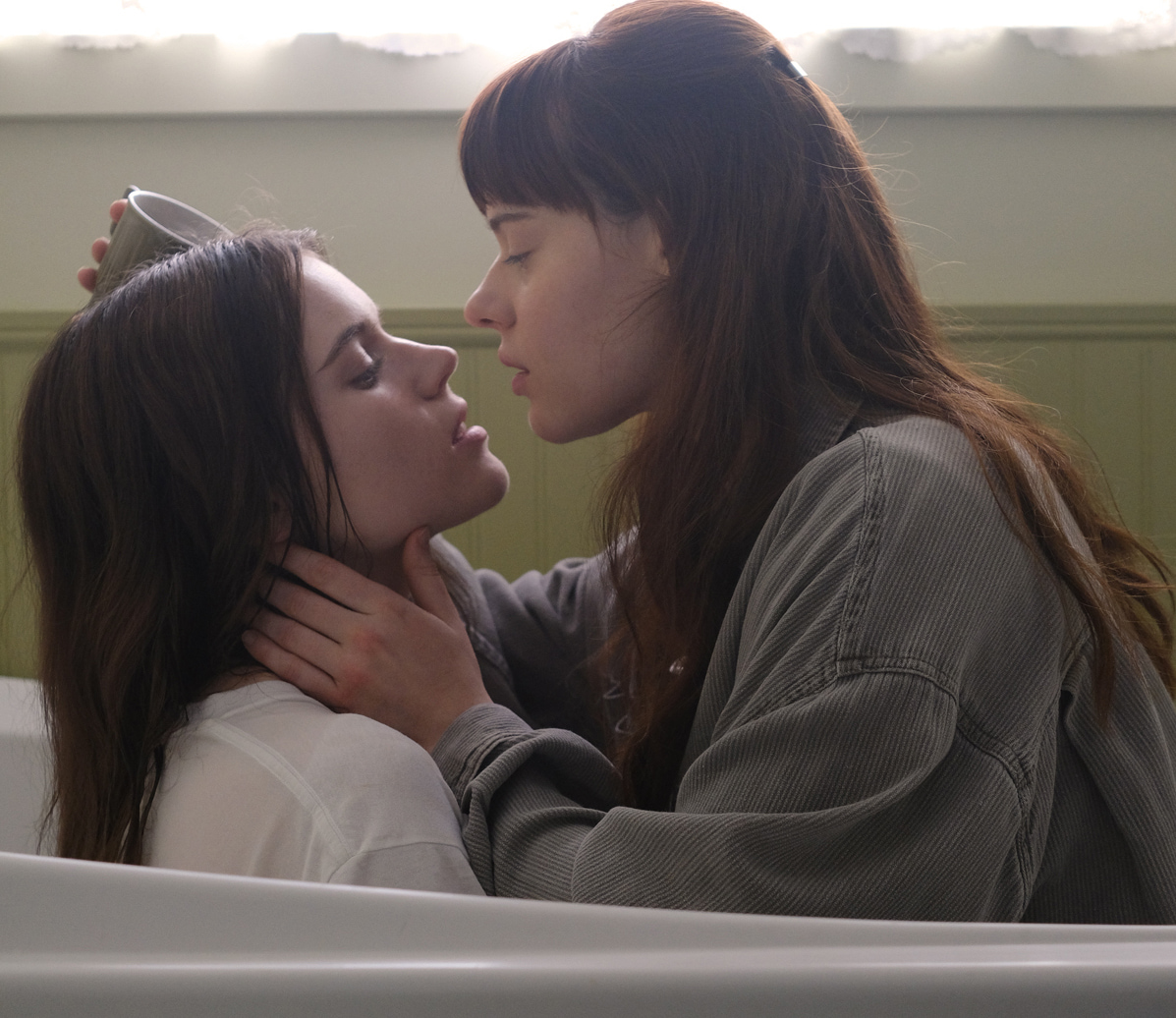Canadian writer-director duo Sarah Watts and Mark Slutsky bring to life a powerful story of young love, religion and queerness in the indie feature You Can Live Forever (now out on VOD). Set in a Jehovah’s Witness community in Saguenay, Quebec, the film tells the story of two teens experiencing all the longing, anxiety and joy of first love, but under the stifling grip of blind faith. Emotionally stirring, the film might seem yet another painful exploration of queer trauma. Instead, You Can Live Forever is a celebratory journey, one where happiness, truth and love is possible.
Thanks to the appearance of a portable cassette player, it’s immediately apparent that You Can Live Forever is set in the 1990s or earlier—with the mention of Bram Stoker’s Dracula being released in theatres, we know it’s 1992. The film is loosely based on the experience of Watts, who grew up in a remote Jehovah’s Witness community in northern Canada. But, as she states in the film’s press notes, this movie is the one she “always wanted to see as a teenager.” The writer-director’s inside perspective honours both her own story and that of closeted teens in religious congregations.
Jaime (Anwen O’Driscoll) is the last person you’d expect to find in a religious setting. Smoking joints hidden in a cassette case, wearing a Siouxsie and the Banshees T-shirt and red flannel button-up, she stands out too much. Her parents left the faith long ago when she was a child, but the Thunder Bay, Ontario, teen finds herself back in the Saguenay Kingdom Hall she knew as a child. Jaime’s queerness is so apparent in the film’s first scenes it gives the impression that she must have been sent back by her parents to pray the gay away. Surprisingly, that isn’t the case: instead, her dad has died and her mom needs some space to cope. Now staying with her aunt and uncle (who’s studying to become a ministerial servant), there’s the lingering question of whether they know Jaime is a lesbian—their affection toward her feels suspicious, like they’re purposefully ignoring the queer elephant in the room.
While the audience may suspect the motives of everyone in this community—there’s no way they won’t try to indoctrinate her, right?—Jaime is equally wary. Stripped of her black hoodie and jeans, she’s forced to go off to JW meetings in an old-fashioned floral dress. But this seemingly nightmarish situation turns into a rose-coloured daydream. Jaime catches the eye of Marike (June Laporte), an exemplary child of Jehovah, whose father happens to be the community’s minister. Jaime is immediately smitten, a tragedy not unlike falling for a straight girl. It’s a relationship that seems hopeless, but Marike finds herself drawn to Jaime, too. As they get to know each other, a secret, forbidden romance blossoms.
The leads have wonderful chemistry, evoking a profound tenderness. Every sound fades away when the pair look at one another, Marike blinking out of sexual self-realization. In a classic must-have piano scene à la Carol or Portrait of a Lady on Fire, desire hits its first notes, as well as the fear to act on it. Their closeness is deeply rooted in shared grief; Jaime for her father and Marike for her mother who was “disfellowshipped,” cast out of the community to be treated as deceased. For them, the looming threat of Marike being cast out, too, is always present and that creates an incredibly complex relationship, where glances, touches and wordless communication work to establish both their emotional connection and their fear of discovery and its repercussions.
Tensions build as the pair’s obvious attraction spurs suspicion within the community and Jaime’s worldliness is seen as a threat to Marike’s faith. The audience is filled with dread for what seems to be inevitable heartbreak. Marike has to deal with a confusing tug of war between her feelings and her beliefs, and Jaime learns the pain of patience. “It just sucks that I have to keep pretending,” Jaime tells a friend. In the end, the film poses a very difficult question for the two young women to answer: how much of yourself are you willing to give up for love?
Watts and Slutsky surprise in creating a film that doesn’t want to focus on trauma, while still remaining truthful to the experience of growing up in a religious community. While Jehovah’s Witnesses believe in a future heavenly paradise on earth, it’s not for homosexuals. So the filmmakers create a paradise for Jaime and Marike, as they carefully navigate their relationship. They are allowed to forget, for a moment, their environment and all that entails. But, of course, reality sets in.
In one scene, Marike refuses to let go of Jaime’s hand. “Not gonna let me go?” Jaime asks. It’s as if they are going to run away together, and why wouldn’t you escape those who imperil your love given the chance? You Can Live Forever emphasizes the challenges of sexual awakening and coming out when a young person’s identity is deeply tied to religious beliefs. The suffocating denial of their true self and feelings is deeply felt in both characters. Watts’s connection to the Jehovah’s Witnesses provides a deep understanding of the psychological tension that results from Marike’s love for her faith and community and the attempt to untether her sexual orientation from her identity.
You Can Live Forever leaves the audience to decide what Jaime and Marike’s journey looks like moving forward. There’s a spark of hope in their realization that paradise already exists here on earth: it’s to live in your own truth and never let go of love.


 Why you can trust Xtra
Why you can trust Xtra


